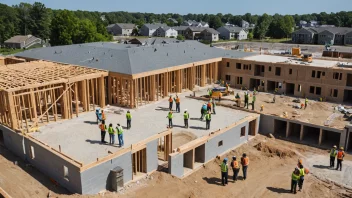Inclusive economic growth is essential for building resilient communities and ensuring that all individuals have the opportunity to thrive. This article explores various strategies that can be employed by local leaders, organizations, and community members to foster an environment of growth that benefits everyone. Here are some key recommendations to promote inclusive economic growth in local communities.
1. Support Local Entrepreneurship
Encouraging local entrepreneurship by providing resources, mentorship, and access to microloans can stimulate economic activity. Local businesses often understand the community's needs better and can create jobs that are tailored to the local workforce.
2. Invest in Education and Skills Development
Providing educational opportunities and vocational training programs is crucial for equipping community members with the skills needed for today’s job market. Initiatives that focus on lifelong learning can help individuals adapt to changing economic conditions.
3. Foster Collaboration Between Stakeholders
Creating partnerships between government, non-profits, and private sectors can lead to innovative solutions for economic challenges. Collaborative efforts can pool resources and expertise to maximize impact.
4. Promote Financial Literacy
Improving financial literacy among community members can empower them to make informed economic decisions. Workshops and resources that teach budgeting, saving, and investing can help individuals manage their finances better.
5. Ensure Accessibility to Resources
Access to essential services, such as healthcare, transportation, and digital infrastructure, is vital for fostering inclusive economic growth. Communities should work to eliminate barriers that prevent individuals from accessing these resources.
6. Encourage Sustainable Practices
Integrating sustainable practices into local businesses not only supports the environment but can also enhance economic resilience. Communities that prioritize sustainability often see long-term economic benefits and improved quality of life.
7. Advocate for Inclusive Policies
Engaging in advocacy for policies that support marginalized groups can lead to more equitable economic opportunities. Local leaders should work to ensure that all community members have a voice in economic development discussions.
8. Create Safe and Inclusive Spaces
Developing spaces that are welcoming and accessible to everyone encourages community engagement and participation. These spaces can serve as hubs for collaboration and innovation.
9. Leverage Technology for Economic Development
Utilizing technology can drive economic growth by improving efficiency and creating new business opportunities. Communities can invest in tech initiatives that support local businesses and provide training on new technologies.
10. Measure and Share Success Stories
Tracking progress and sharing success stories can inspire further action and investment in inclusive economic initiatives. Highlighting positive outcomes can motivate community members and stakeholders to engage in ongoing efforts.
In conclusion, promoting inclusive economic growth requires a multifaceted approach that involves collaboration, education, and advocacy. By implementing these strategies, communities can create an environment that supports the economic well-being of all members, fostering resilience and sustainability for future generations.






